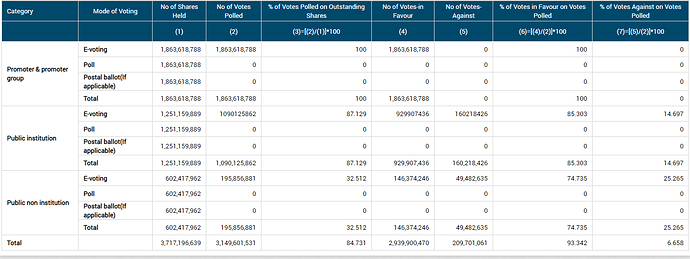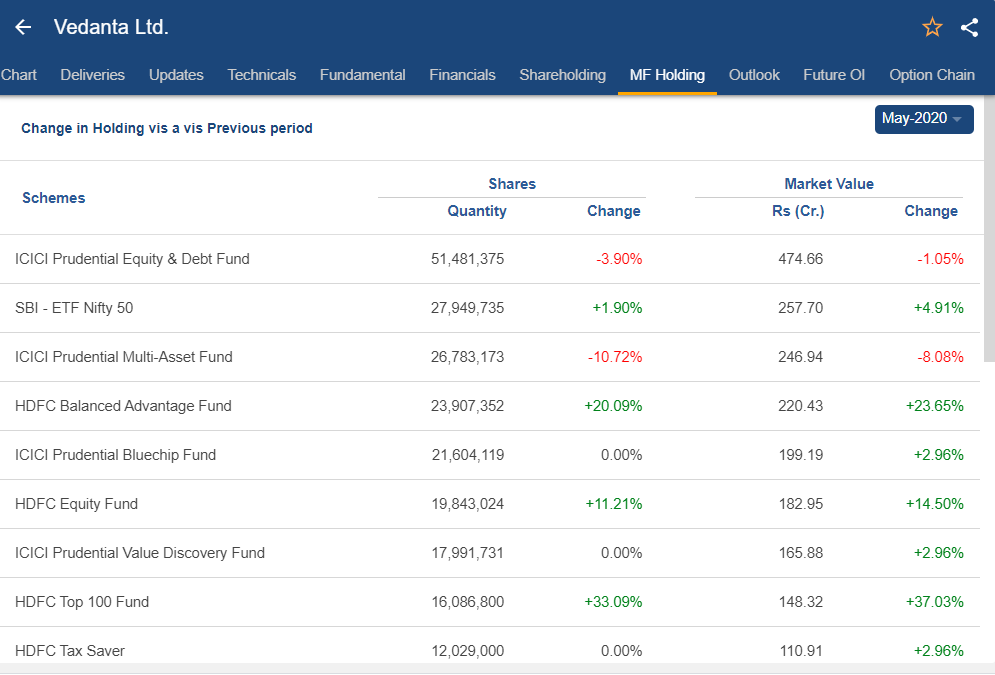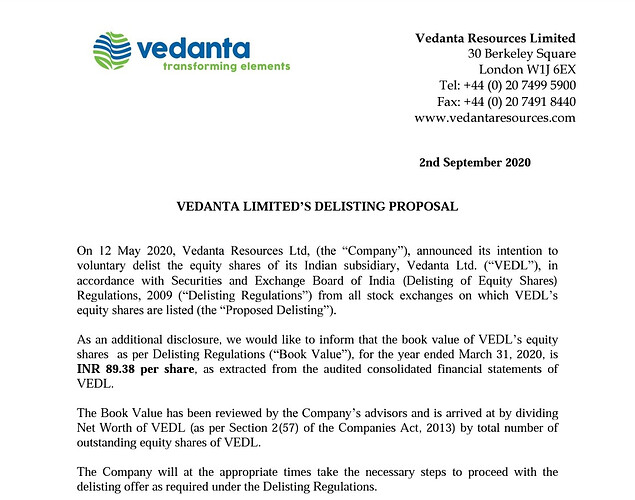Any views on the de-listing? Does it present an arbitrage opportunity?
Asking price is 87 which is much below present price. so hows is it an arbitrage opportunity?
The price of Rs. 87.5 is the de-listing offer price made by the Co. This by no means is the final price which is still some time away from being discovered which will probably be done by the process of reverse book building. The book value is closer to Rs. 150, & I expect the discovered price to be somewhere closer to that than Rs. 87.50
Firm has secured approval on the delisting plan, now the only thing pending is the price…
https://www.bseindia.com/stock-share-price/meetings/voting-results/500295/
“Approval for Voluntary Delisting of the Equity Shares of the Company from BSE Limited (“BSE”) and National Stock Exchange of India Limited (“NSE”) and withdrawal of “Permitted to Trade” status on the Metropolitan Stock Exchange of India Limited (“MSE”), and Voluntary Delisting of the Company’s American Depositary Shares from the New York Stock Exchange and deregistration from the Securities and Exchange Commission.”
Could someone pls help me understand, why have the Public-Institutions also voted in high %ages as Yes for the delisting? 87% particiapted in the evoting and 85% voted in favour. As per May-end shareholding pattern, all the top MF Houses were holding shares in the firm…And Retail though the particpation was only 32.51% but here too 74% voted as Yes!! This really puzzles me…
That gives them more options. Now they have a chance to offer their shares at a price of their choosing. And if they don’t like the offered price, they can keep holding their shares. In fact, if the promoters fail to gather 90%, they cannot delist.
Once the Delisting approved, the company has to do a process for reverse book bidding, to find the final price at which the share will be sold by investors (or bought by company).
In reverse book bidding, each share holder will list their price. The final price will be decided as the price which company has to acquire 90% of the shares.
Now all these institutions and share holders will quote an amount /bid and most people who are holding are with a view that this final price will be higher than 87 (which Vendanta proposed), 110 (current share price) and book value of 150.
Thanks @pkk123 and @phanideep16… So basically if the promoters have to succeed they have to match the price discovered using reverse book building for the balance 39% shares to be tendered(promotors themselves hold 51%) ,and hence unless markets were to go again in a March end like tailspin, the price discovery should be higher than the 87.5 announced earlier. I am thinking 35-40% higher than the price on the day it was annonced. Even with 40% more than 80, would be 112. around the current market price.
Now out of the remaining 49%, retail hold less than 8.55%, so unless it increases beyond 10%, it seems the buyback will go through. Ironically the only way retail can voice their opinion to stop the delisting (at this depressed price) is by buying more stake, but it does’nt make sense to buy or keep holding shares in a firm which does not value minority shareholders…
Promoters also can make counter-offer after reverse book building is completed and they are not happy with the discovered price. In such a scenario, shareholders have to either accept/reject the counter-offer price. Knowing the past antics of this promoter, I feel he would have cornered/have influence on more shares than his listed 51%.
The counter-offer price will have to be greater than the book value of the share and I feel the recent loss announcement was done to lower the book value. I am not tracking this company so just relying on the news.
In my opinion retail investors need not put any bid. In any case they hold less than 10% and cannot affect the outcome. Let the IIs come to a fair price and let’s have that price be discovered as part of RBB. Hopefully, IIs will bargain a good price for us and themselves.
thats a good advice… Even in today’s BL, in an article titled " Delisting Offers: Hold your aces", Aarti Krishnan has argued on the same lines. Infact came to know of something new,
“Investors can tender their shares to the promoter at anytime within a year after the book-building, which the promoter must accept at the discovered price”
Yes that is right. Whatever is the discovered price finally, the promoter must offer to buy back 100% at that price. Its up to the seller to tender or not. However, since post delisting, selling stock would become extremely difficult, its better to tender at whatever price gets decided.
What I feel at this time one must seek what is controllable and the controllable is to limit the downside of the loss . I have burned several times in the past making assumptions that this will happen or that will happen but at the end nothing come fruitful This stock story line demonstrate that one need to study and vigilant before taking any call I am extremely lucky and thankful to the VP which help me to avoid making investment in the scrip I was very bullish in the beginning but now I was realising I was not bullish but foolish .
Regards
disc; this is not any recommendation to buy sell or hold
Which book value counts, at the time buyback announcement or counter offer?
Was expected. As i said in the earlier post after discovered delisting price, if promoter does not accept they can counter offer new price which as per regulations has to be greater than the book value of the share. So they have lowered book value and will show price offered is attractive since its higher than book value…
If the promoter was credible i would have held on to the shares even after delisting for the dividends …
disc - Never invested in Vedanta or any of his companies
Good watch (in Hindi) - https://www.youtube.com/watch?v=UQkbErBVSE8
He also brings out point on how unscrupulous delisted company increase the face value to some high number thereby resulting in those retail holders still holding the shares having fractional share which results in automatic force tendering of the shares.



